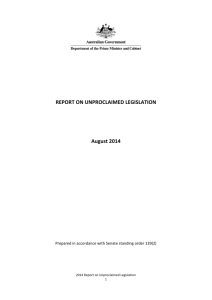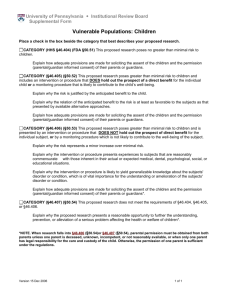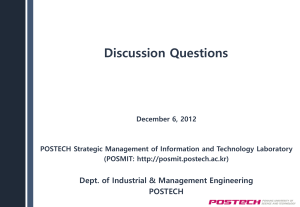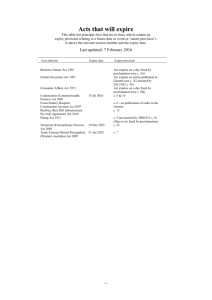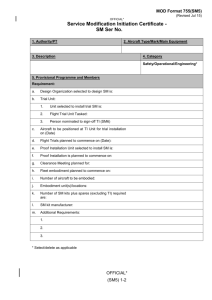2015 Report on Unproclaimed Legislation
advertisement
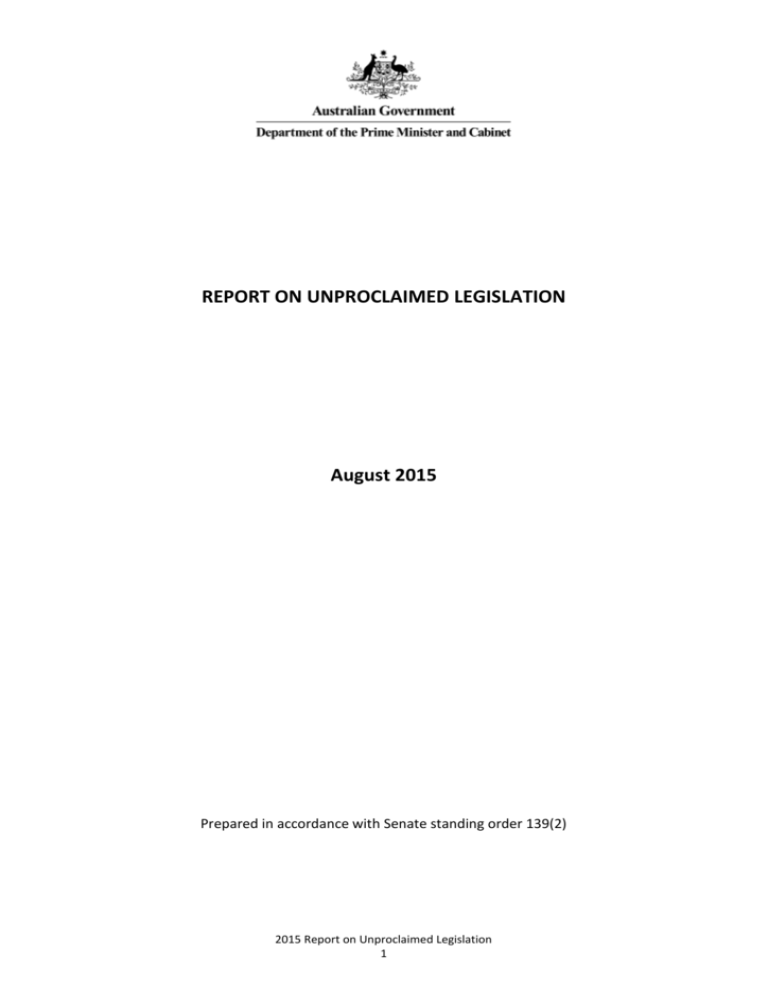
REPORT ON UNPROCLAIMED LEGISLATION August 2015 Prepared in accordance with Senate standing order 139(2) 2015 Report on Unproclaimed Legislation 1 UNPROCLAIMED LEGISLATION Set out below are details of legislation which is to come into effect on Proclamation and which has not yet been proclaimed. The report shows the latest information available at 1 August 2015. AGRICULTURE Biosecurity Act 2015: Sections 3 to 645 This Act received Royal Assent on 16 June 2015. Sections 3 to 645 commence on a single day to be fixed by Proclamation. However, if the provisions do not commence within the period of 12 months beginning on the day the Act received Royal Assent, they commence on the day after the end of that period. The Biosecurity Act 2015 will replace the current quarantine legislation to establish a modern legislative framework that provides for the effective management of a broader range of biosecurity risks and reduces regulatory complexity for both industry and government. The current Quarantine Act 1908 will be repealed upon commencement of section 3 of the Act. The delayed commencement for 12 months of sections 3 to 645 is to allow adequate time for the implementation and transition to the new legislative framework. The Department of Agriculture is delivering a programme to implement subordinate legislation and administrative practices for the commencement of the new biosecurity legislation. ATTORNEY-GENERAL’S Acts and Instruments (Framework Reform) Act 2015: Schedules 1 to 3 This Act received Royal Assent on 5 March 2015. The Acts and Instruments (Framework Reform) Act 2015 commences on a single day to be fixed by Proclamation. However, if the Act does not commence within the period of 12 months beginning on the day the Act received Royal Assent, it commences on the day after the end of that period. There is no timetable for proclamation of the Act. It will automatically commence at the end of the 12 month period, that is, on 5 March 2016. Classification (Publications, Films and Computer Games) Amendment (Classification Tools and Other Measures) Act 2014: Schedule 3, Part 3 and Schedule 7 This Act received Royal Assent on 11 September 2014. 2015 Report on Unproclaimed Legislation 2 Schedule 3 Part 2, Schedule 4 and Schedule 5 of the Classification (Publications, Films and Computer Games) Amendment (Classification Tools and Other Measures) Act 2014 has already commenced as part of the staggered implementation. A proclamation has not been made for Schedule 3 Part 3 and Schedule 7 of the Act. After 11 September 2015, the Act will be fully implemented. Schedule 3 Part 3 commences on a day to be proclaimed or, ‘if the provision(s) do not commence within a period of 12 months beginning on the day the Act receives the Royal Assent, they commence on the day after that period’. If no proclamation is made, Schedule 3 Part 3 commences on 11 September 2015. Schedule 3, Part 3 will introduce new consolidated rules for exemptions in the Classification Act to allow for certain unclassified films, computer games and publications to be exhibited or demonstrated at festivals or special events by festival operators and cultural institutions. The reforms will remove the need to apply to the Director of the Classification Board for formal exemption to exhibit or demonstrate such content, reducing the administrative and regulatory burden on the arts and cultural sector. The Amendment Act deliberately provided for a staggered implementation to provide the states and territories with time to pass consequential amendments. As it is intended that Schedule 3 Part 3 commence on 11 September 2015, no proclamation is required. Schedule 7 commences immediately after the commencement of Schedule 3 Part 3, so will commence on 11 September 2015. It is appropriate that Schedule 7 commence on this date because it includes a simplified outline of the operation of Schedule 3 Part 3. Schedule 7 will amend the Classification Act to include simplified outlines for each part of the Act. These simplified outlines assist readers to understand the substantive provisions of the Act. Crimes Legislation Amendment (Psychoactive Substances and Other Measures) Act 2015: Schedules 1 and 3 This Act received Royal Assent on 5 March 2015. Schedules 1 and 3 of the Act commence on a single day to be fixed by proclamation or, if proclamation does not occur, six months and one day after the Act receives Royal Assent (that is, on 5 September 2015). The unproclaimed provisions in Schedule 1 make amendments to the Criminal Code and Customs Act 1901 to strengthen the Commonwealth’s ability to respond to new and emerging illicit drugs, also known as ‘new psychoactive substances’ (NPS). The amendments give Australian Border Force (ABF) officers the power to stop, seize and destroy substances they reasonably suspect are NPS. The delayed commencement of the Schedule is to allow time for the ABF to prepare the guidelines and procedures necessary to implement the amendments. These guidelines and procedures will be crucial to the success of the measure, which is a new approach to controlling illicit drugs at the border. 2015 Report on Unproclaimed Legislation 3 The unproclaimed provisions in Schedule 3 make a number of amendments to the International Transfer of Prisoners Act 1997 to streamline processes and clarify or simplify some legislative requirements for transfer under the International Transfer of Prisoners (ITP) Scheme. The delayed commencement of the Schedule is to allow time for consequential amendments to the International Transfer of Prisoners Regulations 2002 (ITP Regulations) to be made which are necessary to give full effect to the legislative amendments made by the Act. The consequential amendments to the ITP Regulations are being drafted and it is intended that they will come into effect on the same day that Schedule 3 commences. This will also allow time to ensure that the ITP casework area is prepared for the legislative changes. There is no timetable for proclamation of Schedules 1 and 3. These Schedules will automatically commence at the end of the six month period, on 5 September 2015. Measures to Combat Serious and Organised Crime Act 2001: Schedule 4, Item 10 This Act received Royal Assent on 1 October 2001. Subsection 2(4) of the Act provides that item 10 of Schedule 4 commences on a day to be fixed by proclamation. Item 10 of Schedule 4 of the Act, if proclaimed, would repeal subsection 23A(6) of the Crimes Act 1914 which provides that the existing provisions of Part IC of the Crimes Act 1914 apply to the investigation of certain Australian Capital Territory (ACT) offences. Since 2001, the ACT has been considering a proposal to enact its own regime for investigating offences (the ACT has enacted its own criminal investigation provisions in other contexts). In April 2010, the ACT began a review of police criminal investigative powers, releasing a discussion paper and forming a Police Powers Steering Committee to consider whether the ACT should enact its own regime for investigative powers. This review is ongoing. The proclamation of item 10 of Schedule 4 of the Act (and therefore the repeal of subsection 23A(6) of the Crimes Act 1914) is dependent on the ACT enacting legislation. Proclamation will be considered at the conclusion of the ACT review. There is currently no timetable for proclamation of this item. Personal Property Securities Amendment (Deregulatory Measures) Act 2015: Schedule 1 This Act received Royal Assent on 25 June 2015. A proclamation has not yet been made for Schedule 1 of the Personal Property Securities Amendment (Deregulatory Measures) Act 2015. The unproclaimed legislation continues the reforms of the Personal Property Securities Act 2009 (the Act) while decreasing the 2015 Report on Unproclaimed Legislation 4 administrative burden the personal property securities regime places on Australian businesses. It amends the Act so that leases of serial numbered goods (for example, motor cars and boats) of 90 days or more will no longer be deemed to be personal property security leases for the Act’s purposes. This will simplify the deeming provisions in the Act and minimise the need for small and medium hire businesses to make registrations in respect of leases of a term of less than 12 months. Some stakeholders will need to adjust their business systems to ensure compliance with the amendments. These stakeholders are currently being consulted on an appropriate commencement date, which is proposed to be 1 October 2015 to coincide with the beginning of the second quarter of the financial year. Provided there are no significant concerns from stakeholders, it is anticipated that Schedule 1 of the Act will commence by proclamation by the end of September 2015. Tribunals Amalgamation Act 2015: Schedule 8, item 54 This Act received Royal Assent on 26 May 2015. Item 54 of Schedule 8 to this Act makes an amendment contingent on the commencement of the Biosecurity Act 2015 (Biosecurity Act). This amendment would update a reference in subsection 77(2) of the Biosecurity Act about ‘subsection 29(11)’ of the Administrative Appeals Tribunal Act 1975 with a reference to ‘subsection 29AC(1)’, as this provision has now been renumbered. The Biosecurity Act received Royal Assent on 16 June 2015. Its commencement provisions are set out in table item 2 of subsection 2(1) of the Biosecurity Act. ENVIRONMENT Antarctic Treaty (Environment Protection) Amendment Act 2012: Schedule 1, Part 1 and Schedule 2, Part 1 This Act received Royal Assent on 28 June 2012. Schedule 1 of the Act implements Measure 4 (2004) adopted by the 27th Antarctic Treaty Consultative Meeting at Cape Town on 4 June 2004 by amending the Antarctic Treaty (Environment Protection) Act 1980. The purpose of the Schedule is to provide the Minister with the ability to grant a safety approval and to implement new offences and civil penalties regarding unapproved activities. Schedule 1, Part 1, contains the provisions related to the granting of safety approvals and commences on the earlier of: a day fixed by proclamation; and the day Measure 4 (2004) comes into force for Australia. Measure 4 (2004) will not come into force for Australia until all Antarctic Treaty Consultative Parties have approved the measure. The provision to allow for early 2015 Report on Unproclaimed Legislation 5 proclamation of Schedule 1, Part 1 is to enable non-State operators to apply for, and be granted, a safety approval in advance of the offence and civil penalty provisions which commence automatically when Measure 4 (2004) comes into force. When it becomes apparent that Measure 4 (2004) will come into force, the commencement of Schedule 1, Part 1 will be proclaimed. If the proclamation is not made, the Part will commence automatically when Measure 4 (2004) comes into force. At this time it is unlikely that Measure 4 (2004) will come into force in the near future, because it is likely that it will be some years before all Antarctic Treaty Consultative Parties approve the measure. Schedule 2 of the Act implements Measure 1 (2005) adopted by the 28th Antarctic Treaty Consultative Meeting at Stockholm on 17 June 2005. The purpose of the Schedule is to implement Annex VI to the Protocol on Environmental Protection to the Antarctic Treaty: Liability arising from environmental emergencies. This includes the ability for the Minister to grant an environmental protection approval and to implement new offences and civil penalties regarding unapproved activities. Schedule 2, Part 1, contains the provisions related to the granting of an environmental protection approval. Schedule 2, Part 1 of the Act commences on the earlier of: a day fixed by proclamation; and the day Measure 1 (2005) comes into force for Australia. Measure 1 (2005) will not come into force for Australia until all Antarctic Treaty Consultative Parties have approved the measure. The provision to allow for early proclamation of Schedule 2, Part 1 is to enable operators to apply for, and be granted, an environmental protection approval in advance of the offence and civil penalty provisions which commence when Measure 1 (2005) comes into force. When it becomes apparent that Measure 1 (2005) will come into force, the commencement of Schedule 2, Part 1 will be proclaimed. At this time it is unlikely that Measure 1 (2005) will come into force in the near future, because it is likely that it will be some years before all Antarctic Treaty Consultative Parties approve the measure. FOREIGN AFFAIRS AND TRADE Comprehensive Nuclear-Test-Ban Treaty Act 1998: Part 3, Divisions 2 and 3 of Part 4 and sections 66, 67, 73, 76 and 77 This Act received Royal Assent on 2 July 1998. Part 3 and Divisions 2 and 3 of Part 4 of the Act will commence on the day on which the Comprehensive Nuclear-Test-Ban Treaty enters into force for Australia. Sections 66, 67, 73, 76 and 77 will commence on a day or days to be fixed by proclamation, or, if these provisions do not commence before the day on which the Treaty enters into force for Australia, the provisions commence on that day. The Minister must announce by notice in the Gazette the day on which the Treaty enters into force for Australia. Part 3 provides for: Organization inspectors to inspect sites in Australia; Australia to respond (including by inspecting sites in Australia) to another State Party’s request for clarification about compliance with the Treaty; and searches for and seizures of evidence 2015 Report on Unproclaimed Legislation 6 relating to offences. Part 3 also deals with inspection warrants, and the conduct of inspections and has some general rules about warrants. Division 2 of Part 4 provides for access to facilities, inspection of land, and establishment of facilities and maintenance of facilities. Division 3 of Part 4 provides rules for exercising Division 2 powers. Section 66 designates who is a national inspector and section 67 outlines the requirements for identity cards of national inspectors. Section 73 permits regulations to be made conferring privileges and immunities on the Organization and associated persons. Section 76 is a disclaimer of liability for acts or omissions by the Organization or an Organization inspector. Section 77 confers legal personality and capacity on the Organization. These provisions deal with Australia’s relationship with the future Comprehensive Nuclear-Test-Ban Treaty Organization and inspections functions of the Organization – matters which will be relevant only after the entry into force of the Treaty for Australia. The Treaty will enter into force 180 days after the 44 states listed in Annex 2 to the Treaty have deposited their instruments of ratification with the Secretary-General of the United Nations. At 6 July 2015, the Treaty has been signed by 183 countries and ratified by 164. Of the 44 listed states, 36 have ratified. Australia’s instrument of ratification was deposited on 9 July 1998. HEALTH Health Practitioner Regulation (Consequential Amendments) Act 2010: Schedule 1 This Act received Royal Assent on 31 May 2010. Schedule 1 commences on a single day to be fixed by proclamation. Schedule 1 is the operative part of the Act and provides for consequential amendments to the Health Insurance Act 1973 and the Crimes Act 1914 to recognise and support the implementation of the National Registration and Accreditation Scheme (NRAS) for health professions. Part of a Council of Australian Governments’ intergovernmental agreement signed in March 2008, the NRAS is designed to reduce red tape and address the current inconsistencies in registration standards between the States and Territories. The legislative framework for the NRAS is an applied laws model by the States and Territories. The Commonwealth is not required to apply any laws. Specifically, the unproclaimed provisions in this Act will update definitions to assist in the recognition of health practitioners for the purposes of Medicare and other Commonwealth legislation. The provisions will also streamline current specialist and consultant physician recognition processes for the purposes of Medicare, including removing the current Vocational Register for general practitioners and by aligning data processes and systems 2015 Report on Unproclaimed Legislation 7 used by both the Australian Health Practitioner Regulation Agency (AHPRA) and the Department of Human Services. This alignment has not yet been possible to achieve. Until that time, existing arrangements will continue to apply. The Commonwealth’s Health Practitioner Regulation (Consequential Amendments) Act 2010 received Royal Assent on 31 May 2010. The process for developing the required amendments to the Health insurance regulations has been complex in ensuring that the changes will not result in any disadvantage to medical practitioners’ Medicare eligibility. The amendments to the Commonwealth legislation (and associated regulations) will commence on a date to be proclaimed, and this will occur only in the situation where the Government intends to make the relevant amendments to the Health Insurance regulations. Tobacco Advertising Prohibition Act 1992: Subsections 17(2) to 17(5) and sections 23 to 25 This Act received Royal Assent on 24 December 1992. Subsections 17(2) to 17(5) and sections 23 to 25 commence on a single day to be fixed by Proclamation. Under subsection 17(1) a publication which is printed outside Australia and which is not principally intended for the Australian market can be imported into Australia and sold, even if the publication contains a tobacco advertisement. Tobacco advertising in imported periodicals is exempt so that these publications may continue to be available in the Australian market. Should it appear that tobacco companies are exploiting this exemption, subsections 17(2) to 17(5) and sections 23 to 25 will be proclaimed. Should these provisions be proclaimed, subsection 17(1) will continue to allow the importation and sale of periodicals which contain tobacco advertisements. Proclamation will permit the Minister, in accordance with subsection 17(2), to specify periodicals, or classes of periodicals, to be excluded from the permission in subsection 17(1). Subsections 17(3) to 17(5) relate to the administrative details for this process. Once the Minister specifies a periodical under subsection 17(2), it then becomes an offence under section 23 to import that periodical. A periodical for which a notice is in force under subsection 17(2) can still be imported by a person for private use (under section 24) or for use in exempted libraries (under section 25). INDUSTRY AND SCIENCE Customs Amendment (Anti-dumping Measures) Act (No. 1) 2015: Schedule 1 This Act received Royal Assent on 20 May 2015. Schedule 1 of the Act commences on a single day to be fixed by Proclamation. However, if the provisions do not commence within the period of 6 months beginning on the day the Act received Royal Assent, they commence on the day after the end of that period. 2015 Report on Unproclaimed Legislation 8 The unproclaimed provisions deal with: reducing deadlines for submissions to the Anti-Dumping Commission in response to dumping and subsidisation investigations; requiring anti-dumping notices to be published electronically; consolidating lodgement provisions for anti-dumping applications and submissions; clarifying the length of the investigation period in anti-dumping matters, cumulative assessment of injury, normal value provisions, the calculation of the dumping margin, material injury determinations, and effective notice periods; introducing a fee and raising procedural and legal thresholds for applications to review anti-dumping decisions; and streamlining merits review processes of the Anti-Dumping Review Panel. The delayed commencement of Schedule 1 is to allow adequate time for the development of administrative changes which are necessary to give full effect to the legislative changes made by the Act. It is anticipated Schedule 1 of the Act will commence by proclamation by September 2015. Customs Tariff (Anti-Dumping) Amendment Act 2015: Schedule 1 This Act received Royal Assent on 20 May 2015. Schedule 1 of the Act commences on a single day to be fixed by Proclamation. However, if the provisions do not commence within the period of 6 months beginning on the day the Act received Royal Assent, they commence on the day after the end of that period. The unproclaimed provisions deal with requiring anti-dumping notices to be published electronically and clarifying that the Minister may grant exemptions from dumping duty with limited retrospective effect. The delayed commencement of Schedule 1 is to allow adequate time for the development of administrative changes which are necessary to give full effect to the legislative changes made by the Act. It is anticipated Schedule 1 of the Act will commence by proclamation by September 2015. Intellectual Property Laws Amendment Act 2015: Schedules 2 and 4, and Schedule 5, items 9 to 17 and 19 to 21 This Act received Royal Assent on 25 February 2015. Schedule 2 of the Act makes minor amendments to the Patents Act 1990 to complete Australia’s implementation of the Protocol amending the World Trade Organization (WTO) Agreement on Trade-Related Aspects of Intellectual Property (the TRIPS Protocol), should it come into effect. The amendments correct references to the WTO General Council’s 2003 interim waiver, which will be superseded if the TRIPS Protocol takes effect. There is no timetable for commencement. The provisions will commence automatically if the TRIPS 2015 Report on Unproclaimed Legislation 9 Protocol comes into force in Australia, which will require two thirds of WTO members to accept the TRIPS Protocol. Currently, about half of the WTO members have done so. Schedule 4 of the Act commences on a single day to be fixed by Proclamation. The unproclaimed provisions in Schedule 4 of the Act make amendments to the Patents Act 1990 to implement patent-related initiatives under the Australia New Zealand Single Economic Market, including a single trans-Tasman patent attorney regime. There is currently no timetable for proclamation, as commencement is dependent on the introduction of corresponding legislation in New Zealand. If the provisions do not commence within the period of 24 months beginning on the day after the Act received Royal Assent, the provisions will automatically be repealed on the day after the end of that period. Items 9 to 17 and items 19 to 21 of Schedule 5 of the Act commence on a single day to be fixed by Proclamation. These items make technical amendments to the Patents Act 1990 to clarify the operation of the legislation. There is no timetable for proclamation, however the provisions will commence automatically on the day after the period of six months from the date the Act received Royal Assent has ended. INFRASTRUCTURE AND REGIONAL DEVELOPMENT International Interests in Mobile Equipment (Cape Town Convention) Act 2013: Sections 3 to 10 This Act received Royal Assent on 28 June 2013. Sections 3 to 10 of the Act will commence on a day to be fixed by proclamation or, if the proclamation is not made earlier, the provisions will commence six months from the day the Convention on International Interests in Mobile Equipment (‘the Convention’) and the Protocol thereto on matters specific to aircraft equipment (‘the Protocol’) come into force for Australia. The Act facilitates Australia’s accession to the Convention and the Protocol. The Act provides for the Convention and Protocol to have force of law in Australia and ensures that the Convention and Protocol has precedence over all other laws to the extent that any inconsistency arises. The Act will be proclaimed to commence on the same day as the Convention and Protocol enter into force for Australia (1 September 2015). Interstate Road Transport Act 1985: Sections 24 to 35, subsections 36(1) and 36(5) and section 37 This Act received Royal Assent on 22 November 1985. Sections 24 to 35, subsections 36(1) and 36(5) commence on a day (or days) to be fixed by Proclamation. 2015 Report on Unproclaimed Legislation 10 Sections 24 to 35 relate to a scheme of operator licensing. At the time this legislation was framed it was considered that operator licensing might be a suitable tool for raising operational and safety standards in the road transport industry. To be effective, the scheme requires the full agreement of the industry and passage of complementary legislation by the States and Territories. States and Territories did not agree to enact complementary legislation to enable the national application of operator licensing, and with the passage of time the underlying objectives of operator licensing were sought through alternative means. Commonwealth and State and Territory transport ministers agreed to a national alternative compliance policy in November 1997. In September 1999, ministers voted on model legislation for the three modules (mass management, maintenance management and fatigue management). These alternative compliance arrangements were enacted by jurisdictions as part of the National Heavy Vehicle Accreditation Scheme, which itself forms part of the Heavy Vehicle National Law. This scheme is preserved for participating jurisdictions under chapter 8 of the Heavy Vehicle National Law. Rather than the loss of a license to operate if standards/laws are not met, this approach gives transport operators economic incentives to comply with road transport law. Subsections 36(1), 36(5) and section 37 relate to the use of onboard driver monitoring devices. The Transport and Infrastructure Council is considering a range of measures that may impact on future deployment of this type of technology. In line with the Intergovernmental Agreement on Heavy Vehicle Regulatory Reform signed by First Ministers on 19 August 2011, the Interstate Road Transport Act 1985 will be repealed following the introduction in all participating jurisdictions of a National Registration Scheme under the Heavy Vehicle National Law. The National Law has been proclaimed (excluding chapter 2) in the participating jurisdictions of Queensland, New South Wales, Victoria, Tasmania, South Australia and the Australian Capital Territory. Ministers have agreed that the National Registration Scheme in the Heavy Vehicle National Law will commence once administrative arrangements are resolved by the Transport and Infrastructure Council. Marine Safety (Domestic Commercial Vessel) National Law (Consequential Amendments) Act 2012: Schedule 2 This Act received Royal Assent on 12 September 2012. The legislation is still unproclaimed and there is no change to the current situation. Schedule 2 of the Act provides that Schedule 2 commences on a single day to be fixed by Proclamation. The Proclamation must not specify a day that occurs before the first day there are in force, in each State, laws of the State that the Minister is satisfied correspond substantially to Part 2 of the Work Health and Safety Act 2011. However, if the provision(s) do not commence within the period of 6 months beginning on that first day, they commence on the day after the end of that period. If the provision(s) commence in this way, the Minister must announce by notice in the Gazette the day the provision(s) commenced. The notice is not a legislative instrument. 2015 Report on Unproclaimed Legislation 11 The intention of legislation is to align the provisions under Schedule 2 of the Act with the Commonwealth’s model Work Health and Safety Act 2011. As such, Schedule 2 of the Act, which would set requirements for breaches of general safety duties, can commence when all the States and Territories give effect to, as a State law, the provisions contained in Part 2 of the Work Health and Safety Act 2012. The Department of Employment has advised that Victoria and Western Australia have not yet enacted legislation that corresponds substantially to Part 2 of the Work Health and Safety Act 2011. 2015 Report on Unproclaimed Legislation 12

